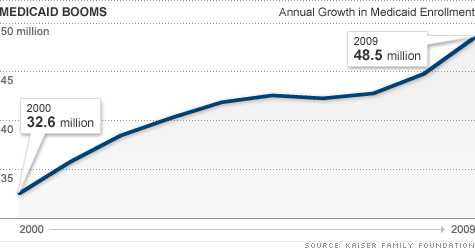Search News

NEW YORK (CNNMoney.com) -- States will have to dig deeper into their already empty coffers next year in order to pay for rising Medicaid costs.
Next fiscal year states will spend 7.4% more on the health care coverage -- which is already one of their biggest expenses -- according to a report released Thursday by the Kaiser Family Foundation.
The severe economic downturn has sent people flocking to state Medicaid programs, which provide health care coverage for the disadvantaged. Next year, enrollment is expected to rise by 6.1%.
Medicaid enrollment increased by nearly 6 million people between the recession's start in December 2007 and the end of 2009, according to separate report by the Kaiser Commission on Medicaid and the Uninsured. Last December, there were 48.5 million enrolled in state Medicaid programs.
This jump in Medicaid enrollment and spending comes just as states are losing federal stimulus funds meant to help them shoulder the rising costs. The American Recovery and Reinvestment Act, passed in February 2009, provided $87 billion to states to pay for Medicaid costs through this December. Congress later allocated another $16 billion.
However, that federal money now dries up June 30, the end of fiscal 2010. And the loss will make it significantly harder for the states to close their budget gaps, already estimated at $121 billion.
"The recession swamped state budgets and Medicaid programs, but with the extra federal aid, Medicaid helped millions of additional people as intended during tough times," said Diane Rowland, executive vice president of the Kaiser Family Foundation, which issued the report Thursday.
The Kaiser Family Foundation report wasn't all bad news, however. It showed that the growth rate of Medicaid spending is slowing. While states will spend 7.4% more in fiscal 2011, the costs grew 8.8% in fiscal 2010, the highest growth rate in eight years.
Though federal stimulus funding restricted states' ability to curb Medicaid enrollment, they still took some steps to rein in spending.
A record 20 states implemented benefits restrictions in fiscal 2010 and 14 states plan to make additional changes in the coming fiscal year. The changes include eliminating dental benefits or limiting services such as therapy and personal care.
Some 39 states cut or froze provider rates, and 37 states plan similar action in fiscal 2011.
Eighteen states implemented reductions in long-term care services, and 10 states plan to do so in fiscal 2011. ![]()






| Index | Last | Change | % Change |
|---|---|---|---|
| Dow | 32,627.97 | -234.33 | -0.71% |
| Nasdaq | 13,215.24 | 99.07 | 0.76% |
| S&P 500 | 3,913.10 | -2.36 | -0.06% |
| Treasuries | 1.73 | 0.00 | 0.12% |
| Company | Price | Change | % Change |
|---|---|---|---|
| Ford Motor Co | 8.29 | 0.05 | 0.61% |
| Advanced Micro Devic... | 54.59 | 0.70 | 1.30% |
| Cisco Systems Inc | 47.49 | -2.44 | -4.89% |
| General Electric Co | 13.00 | -0.16 | -1.22% |
| Kraft Heinz Co | 27.84 | -2.20 | -7.32% |
|
Bankrupt toy retailer tells bankruptcy court it is looking at possibly reviving the Toys 'R' Us and Babies 'R' Us brands. More |
Land O'Lakes CEO Beth Ford charts her career path, from her first job to becoming the first openly gay CEO at a Fortune 500 company in an interview with CNN's Boss Files. More |
Honda and General Motors are creating a new generation of fully autonomous vehicles. More |
In 1998, Ntsiki Biyela won a scholarship to study wine making. Now she's about to launch her own brand. More |
Whether you hedge inflation or look for a return that outpaces inflation, here's how to prepare. More |